If you’ve been out to a show, club, bar—or hell, just outside your house lately—and you live in an urban area and are a certain kind of person (say, tattoo-having, or pierced)—you’ve likely been offered the exciting opportunity to receive, free of charge, a few boxes of Camel cigarettes. By some funny-colored-hair dude. Just for writing down your email address.
It’s led to some disturbing conversations in my circles, especially as I’ve rather struck up a friendship with the funny-colored-hair dude, who, owing to his lax attitude as regards the limits on the number of packs he gives out, genuinely sees his work as helpful to the community. Who would otherwise, he argues, be spending their money on these things.
Well, of course the kid’s shilling for big tobacco, problem one, to a community not known for its access to health facilities, problem two, and not owning up to it, problem three, and somehow thinks he’s bucking the system by giving away extra free packs of the smokes, which is likely all a part of the strategy in the first place—in other words, Camel predetermined his mode of dissent and worked it into their marketing plan—problem four. Yet more disturbingly, and more recently, RJ Reynolds has instituted the Farm, which seems to be a simple expansion of this dude’s approach to marketing cigs to other indie kids.
The Farm is a co-branding experience, an unpleasant situation in which the cigarette company showcases local “up-and-coming” bands, free of charge, in local venues, and sets up an elaborate tent inside these venues to give away more free cigarettes, branded CDs, and logoed stickers. (Note to the addicted hipster underagers: when I went to one of these shows, I wasn’t asked for ID at the venue door nor at the tent. Even weirder: there is no photography allowed inside the venue while Farm concerts are ongoing—not even by the bands themselves. This was so staunchly enforced at the show I attended, one viewer wondered if there were something illegal occurring. But Chicago’s smoking ban isn’t in full force yet, and I’m no cigarette cop anyway.)
The big names that play the Farm are unsurprising: Flaming Lips, Phoenix, G. Love and Special Sauce, The Black Keys, Dinosaur Jr, Dr. Dog, and Band of Horses. Whatever. Those guys, it could be argued, have names to fall back on. But the smaller names matter too: here in Chicago I caught The Its, Big Buildings, and Telenovela. I went to see these bands at their personal invitation. Which—like the show posters—gave no indication at all that I was about to enter Flavor Country.
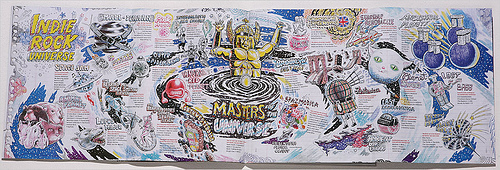
The Farm’s approach to marketing smokes in an age when they are being heavily restricted in public spaces is exemplified by a recent Rolling Stone advertorial “fold-out poster” noted in this article, which seems to be causing a bit of controversy. Its uncanny similarity to “a cartoon” seems to be the basis for the balking, as cartoons are no longer allowed in cigarette advertisements (umm, because line drawings are thought to appeal primarily to youth, FYI). And although this particular section is arguably “editorial,” confusion nonetheless reigns.
Which seems to be the advertising strategy at play throughout the Farm campaign: confuse, confuse, confuse, hey! Let’s smoke.
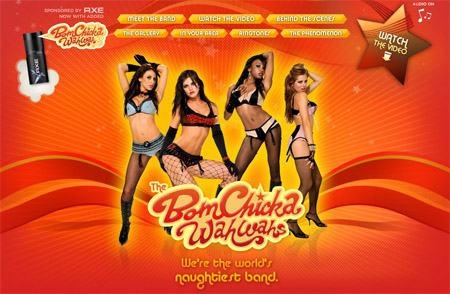 If you haven’t seen them, the Dove commercials are as genius as they are insidious (see Onslaught and Evolution, for instance). As the Campaign for a Commercial-Free Childhood pointed out last month, Dove is owned by Unilever, which also produces Axe body spray and other personal hygiene products. So while the makers of Dove attack advertising that exploits female bodies, they’re producing scores of those ads at the very same time. The Axe campaign, however, is particularly obnoxious. As media literacy consultant Bob McCannon has said:
If you haven’t seen them, the Dove commercials are as genius as they are insidious (see Onslaught and Evolution, for instance). As the Campaign for a Commercial-Free Childhood pointed out last month, Dove is owned by Unilever, which also produces Axe body spray and other personal hygiene products. So while the makers of Dove attack advertising that exploits female bodies, they’re producing scores of those ads at the very same time. The Axe campaign, however, is particularly obnoxious. As media literacy consultant Bob McCannon has said:
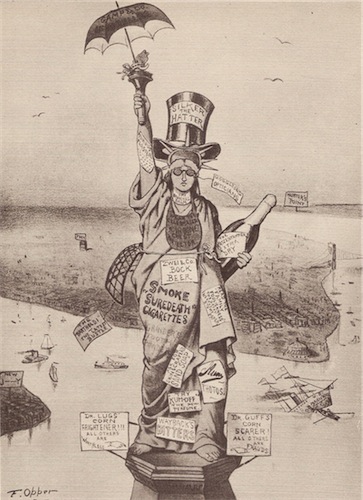

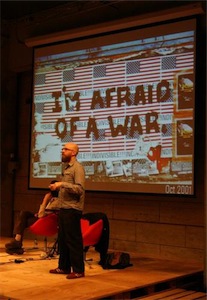 Gracias por venir. Este es las
Gracias por venir. Este es las 

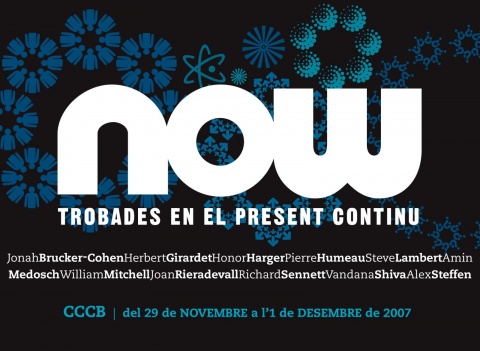



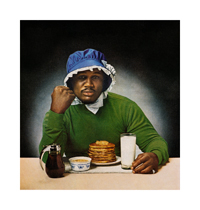
 A proposition was on San Francisco’s city election ballot yesterday which would put the city on the path to reducing outdoor advertising. I honestly have not heard much about Proposition K in the run up to the election. The
A proposition was on San Francisco’s city election ballot yesterday which would put the city on the path to reducing outdoor advertising. I honestly have not heard much about Proposition K in the run up to the election. The  The city was sued by Desert Outdoor Advertising, a national advertising firm which is a subsidiary of an
The city was sued by Desert Outdoor Advertising, a national advertising firm which is a subsidiary of an
Fake CEO Blogs
via Joey Skaggs’ The Art of the Prank:
Posted by harshavardhan on Thought Beans Blog, November 2, 2007:
It is written by Daniel Lyons, a senior Editor at Forbes Magazine. It took almost 14 months to find out the author of this Fakesteve Blog. Daniel writes the Technology articles for Forbes.
There are other fake CEO blogs:
Fake Richard Branson blog
Fake Larry Ellison
Fake Bill
Fake Schwartz
Fake Steve Ballmer
Fake Steve
Thanks David Strom. Photo image: TheAge.com.au.
Related link:
Author of Fake Steve Jobs Blog Outed